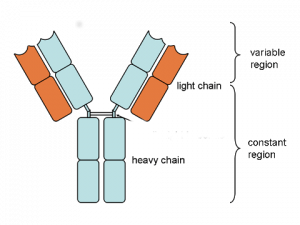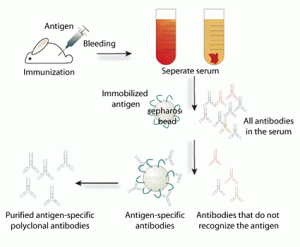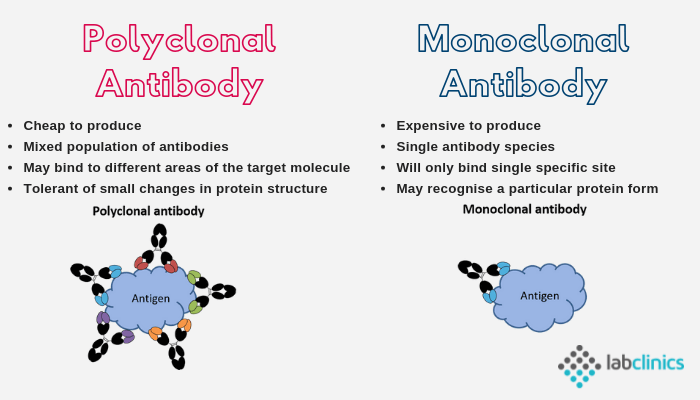People often ask us: What is the difference between a monoclonal and polyclonal antibody? This is a great question as these antibodies differ greatly in how they are produced and what they can be used for. We have broken the two types down to outline everything you need to know about polyclonal and monoclonal antibodies.
- What is the difference between polyclonal and monoclonal antibodies?
- Polyclonal vs Monoclonal Antibodies: differences in production
- Polyclonal antibodies: advantages and disadvantages
- Monoclonal antibodies: advantages and disadvantages
- Final remarks
¿What is the difference between polyclonal and monoclonal antibodies?
 Antibodies, also known as immunoglobulins, are secreted by B cells to neutralize antigens such as bacteria and viruses. The classical representation of an antibody is a Y-shaped molecule composed of four polypeptides-two heavy chains and two light chains. Each tip of the “Y” contains a paratope (a structure analogous to a lock) that is specific for one particular epitope (similarly analogous to a key) on an antigen, allowing these two structures to bind together with precision. The ability of binding to an antigen has led to their ubiquitous use in a variety of life science and medical science. These antibodies can be classified into two primary types (monoclonal and polyclonal) by the means in which they are created from lymphocytes. Each of them has important role in the immune system, diagnostic exams, and treatments.
Antibodies, also known as immunoglobulins, are secreted by B cells to neutralize antigens such as bacteria and viruses. The classical representation of an antibody is a Y-shaped molecule composed of four polypeptides-two heavy chains and two light chains. Each tip of the “Y” contains a paratope (a structure analogous to a lock) that is specific for one particular epitope (similarly analogous to a key) on an antigen, allowing these two structures to bind together with precision. The ability of binding to an antigen has led to their ubiquitous use in a variety of life science and medical science. These antibodies can be classified into two primary types (monoclonal and polyclonal) by the means in which they are created from lymphocytes. Each of them has important role in the immune system, diagnostic exams, and treatments.
Polyclonal vs Monoclonal Antibodies: differences in production

The process to generate the polyclonal antibody
Polyclonal antibodies (pAbs) are mixture of heterogeneous which are usually produced by different B cell clones in the body. They can recognize and bind to many different epitopes of a single antigen.
Polyclonal antibodies are produced by injecting an immunogen into an animal. After being injected with a specific antigen to elicit a primary immune response, the animal is given a secondary even tertiary immunization to produce higher titers of antibodies against the particular antigen. After immunization, polyclonal antibodies can be obtained straight from the serum (blood which has had clotting proteins and red blood cells removed) or purified to obtain a solution which is free from other serum proteins.
Monoclonal antibodies (mAbs) are generated by identical B cells which are clones from a single parent cell. This means that the monoclonal antibodies have monovalent affinity and only recognize the same epitope of an antigen.
Unlike polyclonal antibodies, which are produced in live animals, monoclonal antibodies are produced ex vivo using tissue-culture techniques. The process begins with an injection of the desired antigen into an animal, often a mouse, multiple times. Once the animal develops an immune response, the B-lymphocytes are isolated from the animal’s spleen and fused with a myeloma cell line, creating immortalized B cell-myeloma hybridomas. The hybridomas, which are able to grow continuously in culture while producing antibodies, are then screened for desired mAb.
Polyclonal antibodies: advantages and disadvantages
The advantages and disadvantages of polyclonal antibodies were mainly determined by their multi-epitope specificity. The key advantages and disadvantages are listed below:
Advantages:
- Inexpensive and relatively quick to produce (+/- 3 months).
- Higher overall antibody affinity against the antigen due to the recognition of multiple epitopes.
- Have a high sensitivity for detecting low-quantity proteins.
- High ability to capture the target protein (recommended as the capture antibody in a sandwich ELISA).
- Antibody affinity results in quicker binding to the target antigen (recommended for assays that require quick capture of the protein; e.g., IP or ChIP).
- Superior for use in detecting a native protein.
- Easy to couple with antibody labels and rather unlikely to affect binding capability.
Disadvantages:
- Batch-to-batch variability as produced in different animals at different times.
- High chance of cross-reactivity due to a recognition of multiple epitopes (affinity purified antibodies display a minimum cross-reactivity).
Monoclonal antibodies: advantages and disadvantages
Advantages:
- Batch-to-batch reproducibility (high homogeneity).
- Possibility to produce large quantities of identical antibody (an advantage for diagnostic manufacturing and therapeutic drug development).
- High specificity to a single epitope reflected in low cross-reactivity.
- More sensitive in assays requiring quantification of the protein levels.
- Low background noise.
Disadvantages:
- More expensive to produce. It is necessary to produce a pool of several monoclonal antibodies.
- Requires significantly more time to produce and develop the hybridized clone (+/- 6 months).
- More susceptible to binding changes when labeled.
Final Remarks
Polyclonal antibodies are made using several different immune cells. They will have the affinity for the same antigen but different epitopes, while monoclonal antibodies are made using identical immune cells that are all clones of a specific parent cell (Figure 1).

For applications such as therapeutic drug development that require large volumes of identical antibody specific to a single epitope, monoclonal antibodies are a better solution. For general research applications, however, the advantages of polyclonal antibodies typically outweigh the few advantages that monoclonal antibodies provide. With affinity purification of serum against small antigen targets, the advantages of polyclonal antibodies are further extended.
¿Tienes dudas?
Si no te queda claro del todo cómo funciona esta tecnología, o quieres que te ayudemos a configurar tu ensayo, nuestro departamento técnico de especialistas, con amplia trayectoria en investigación (todos PhD), te pueden echar una mano: por mail (tecnic@labclinics.com), por tlf +34.934464700 o de forma presencial. Contáctanos y estaremos encantados de poder ayudarte!





Leave a reply